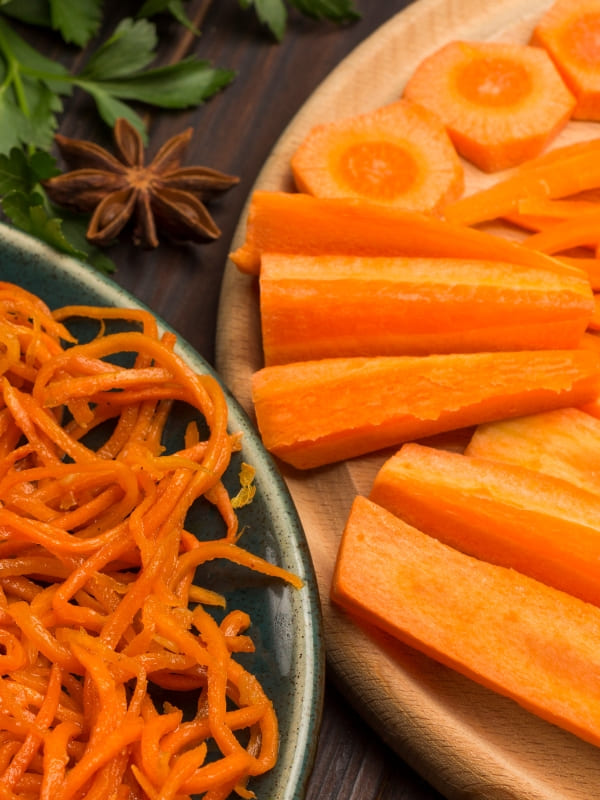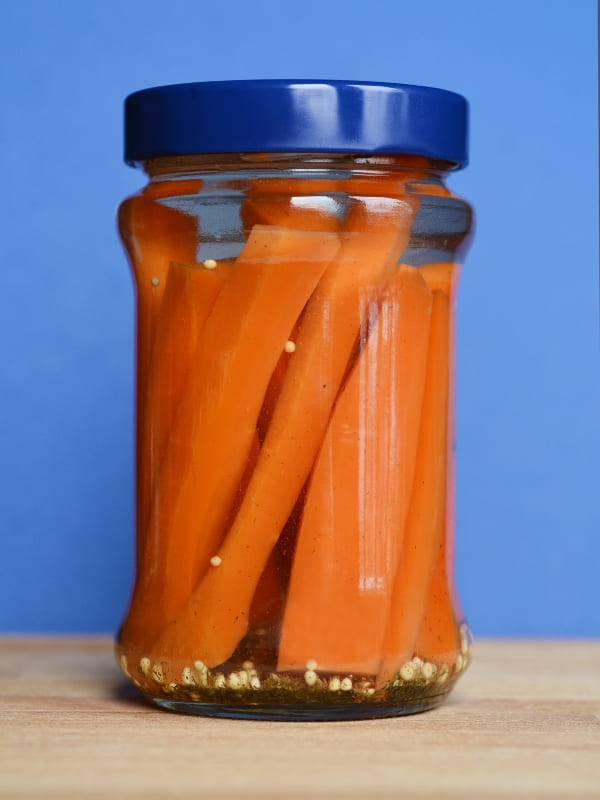Fermented carrots are a tangy, crunchy snack loaded with health-boosting probiotics and nutrients. They are a testament to the power of lacto-fermentation, a centuries-old preservation method that enhances the nutritional value of vegetables.
By immersing carrots in a saltwater brine, beneficial bacteria convert natural sugars into lactic acid, giving them their distinct tangy flavor while inhibiting harmful bacteria.
This simple yet transformative process not only extends the shelf life of carrots but also enriches their nutritional profile. Let’s delve into their remarkable health benefits and learn how to make and use them in your daily life.
#1. Supports Gut Health
Fermented carrots are rich in probiotics, the beneficial bacteria that maintain a healthy gut microbiome. Consequently, these bacteria improve digestion, reduce bloating, and alleviate symptoms of irritable bowel syndrome (IBS).
Furthermore, a study published in Frontiers in Microbiology found that consuming fermented foods significantly increases microbial diversity in the gut, thereby promoting better digestion and overall gut health.

#2. Boosts Immune Function
A healthy gut is the cornerstone of a strong immune system, and the probiotics in fermented carrots help regulate immune responses and reduce inflammation.
Additionally, carrots are naturally high in vitamin C, which strengthens your body’s defenses against infections and promotes faster recovery.
#3. Enhances Digestive Health
The lactic acid in fermented carrots balances gut pH levels and enhances nutrient absorption.
Meanwhile, their dietary fiber content supports regular bowel movements, reduces bloating, and prevents constipation, making them an excellent choice for digestive support.

#4. Improves Skin Health
The antioxidants and probiotics in fermented carrots combat oxidative stress, which can lead to premature aging and skin issues.
Beta-carotene in carrots, which converts into vitamin A, promotes skin repair, reduces acne, and helps maintain a healthy complexion.
#5. Supports Heart Health
The potassium found in carrots helps regulate blood pressure, while probiotics in fermented foods can lower LDL cholesterol levels.
Together, these elements contribute to better cardiovascular health and reduced risk of heart disease.

#6. Aids in Detoxification
Fermented carrots stimulate liver enzymes, aiding in the detoxification of harmful substances from the body.
Additionally, their diuretic properties help flush out toxins and maintain kidney health.
#7. Promotes Weight Management
Low in calories but high in fiber, fermented carrots help you feel full longer, reducing cravings for unhealthy snacks.
Probiotics in fermented foods also improve metabolism, making them a valuable addition to any weight-loss regimen.

#8. Enhances Mental Well-Being
The gut-brain connection means that probiotics in fermented carrots can positively influence mood, reduce stress, and enhance cognitive function.
In fact, fermented foods are linked to lower levels of social anxiety and improved mental clarity.
#9. Strengthens Bones
Carrots are a natural source of vitamin K, essential for calcium absorption and bone density.
Fermentation further enhances the bioavailability of this vitamin, supporting stronger bones and reducing the risk of osteoporosis.

#10. Provides Antioxidant Protection
Fermented carrots are rich in antioxidants like beta-carotene, which neutralize free radicals and reduce the risk of chronic diseases.
These antioxidants also play a vital role in supporting cellular health and longevity.
How to Make Fermented Carrots
1. Ingredients
2 pounds of organic carrots
4 cups of filtered water
4 teaspoons of sea salt (unrefined and non-iodized)
4–6 garlic cloves (optional)
2–3 sprigs of fresh dill or your preferred herb (optional)
2. Equipment
- Two quart-size mason jars or two 32-ounce fido jars
- Fermentation weights
3. Instructions
Prepare the carrots:
First, wash the carrots thoroughly and trim off the tops. Then, cut them into sticks or slices, ensuring they fit comfortably in your jar, and leave about 1–1.5 inches of headspace at the top.
Layer the jar:
Next, place garlic cloves and dill at the bottom of each jar. After that, add the carrot sticks, packing them tightly to prevent floating during fermentation.
Make the brine:
Dissolve the sea salt in the filtered water to create a brine. Then, pour this brine over the carrots, ensuring they are fully submerged.
Add weights:
Place fermentation weights on top of the carrots to keep them submerged in the brine.
Seal the jar:
Following this, secure the jar with an airlock lid or a fido jar lid. If using a fido jar, remember to “burp” it every few days to release built-up gases.
Ferment:
Finally, leave the jar at room temperature, out of direct sunlight, for 3–5 days. You can taste the carrots after three days and transfer them to the refrigerator once they reach your desired tanginess.

How to Use Fermented Carrots
- Snack on them: Fermented carrots make an excellent, healthy snack option straight from the jar. Their tangy and crunchy texture is perfect for midday hunger pangs or as a light bite between meals. You should enjoy 4–6 sticks per day for a probiotic boost.
- Pair with dips: Elevate your snacking game by pairing fermented carrots with dips like hummus, ranch dressing, guacamole, or tzatziki. The tanginess of the carrots complements the creamy texture of these dips beautifully. Use 6–8 sticks for an appetizer platter or snack session.
- Add to salads: Chop fermented carrots into bite-sized pieces and toss them into your salads. Their vibrant tang and crunch pair well with leafy greens, quinoa, or grain bowls, adding both flavor and nutritional value. Include 1/4 cup of chopped fermented carrots in your salad for a daily probiotic boost.
- Enhance sandwiches: Fermented carrots add a delightful crunch and tang to sandwiches, wraps, or burgers. Use them as a flavorful topping for a healthier twist on your favorite meals. Add 2–3 carrot sticks or equivalent slices per serving for a balanced flavor.
- Stir into soups: For a nutritious kick, add fermented carrots to soups or stews at the end of cooking. This method retains their probiotic benefits while enhancing the dish’s flavor. You can use 1/4 cup of chopped fermented carrots per bowl of soup or stew.

Cautions and Precautions
Fermented carrots are high in sodium due to the brine, so consume them in moderation if you’re on a low-sodium diet.
Although rare, some individuals may experience sensitivity to fermented foods. Start with small amounts if you’re new to fermentation.
Always ensure clean jars and tools to avoid contamination during the fermentation process.
Disclaimer
This article is for informational purposes only and is not a substitute for professional medical advice.
Consult a healthcare provider before introducing fermented foods into your diet, especially if you have health conditions or dietary restrictions.

Tangy, Crunchy, and Full of Benefits: Discover the Power of Fermented Carrots
